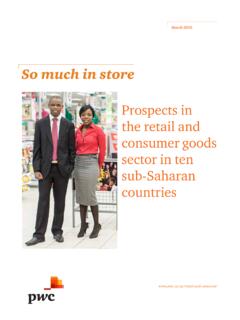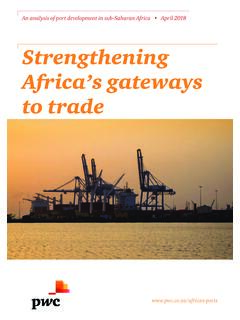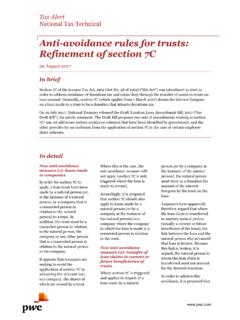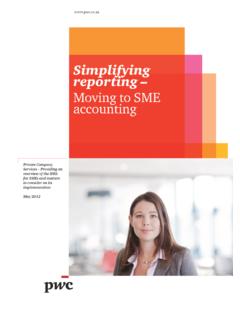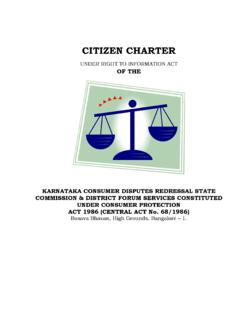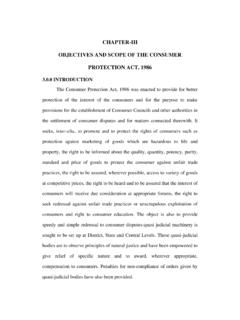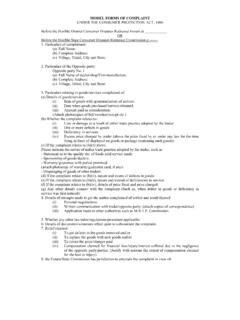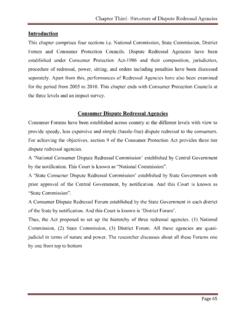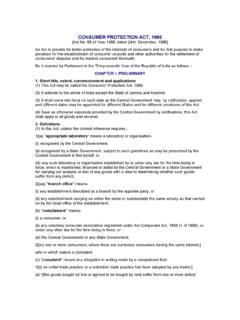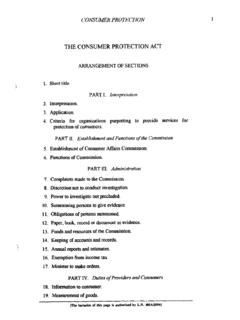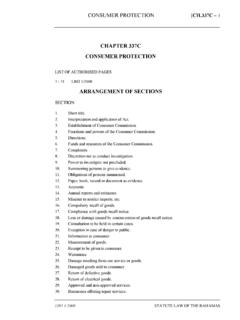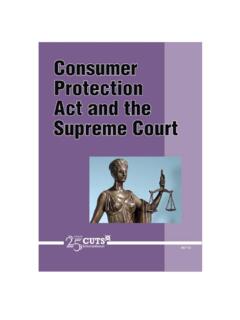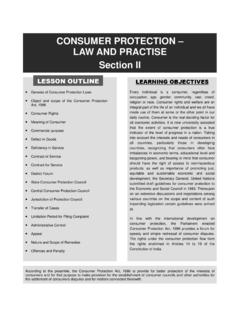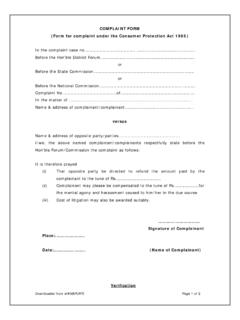Transcription of Knowledge is power - PwC
1 Knowledge is powerConsumer protection Act Series #1 Make sure you don t get it wrong on consumer rightsNovember proposal is protected under the copyright laws of South Africa and other countries as an unpublished work. This proposal contains information that is proprietary and confidential to PricewaterhouseCoopers Incorporated, which shall not be disclosed outside the recipient s company or duplicated, used or disclosed in whole or in part by the recipient for any purpose other than to evaluate this proposal. Any other use or disclosure in whole or in part of this information without the express written permission of PricewaterhouseCoopers Incorporated is this issue: We provide an overview of the consumer protection Act (CPA), its application and the arrangement of the Act We discuss the date when the CPA will apply to business We highlight matters that will be more fully discussed in future publications of the PwC consumer protection Act Series We discuss how the CPA currently applies to business prior to 31 March 2011 We provide business with an overview of matters to consider in preparation of implementation of the CPA We summarise the penalties for non-compliance with the CPAC onsumer protection Act Series #1 Knowledge is power 1 Overview of the CPAS outh Africa s consumer protection Act, No.
2 68 of 2008 (CPA) is fully effective from 31 March 2011. Background to the CPAThe CPA is the result of a long process of reform and development in the field of consumer protection in South Africa. The CPA affects the relationships between consumers and businesses, covering a wide range of matters in this relationship including: A comprehensive revision of the law of sale; A control framework to ensure the fairness of contracts; A modified liability regime where a product causes death or injury and specific requirements relating to product safety; New protective mechanisms for consumers to exit from contractual obligations; and Provisions relating to marketing and marketing practices. 2 consumer protection Act Series #1 Knowledge is power Arrangement of the ActIn addition to the usual chapters on interpretation, purpose, application, enforcement and general provisions, the CPA consists of: Chapter 2 : Fundamental consumer Rights; Chapter 3 : The protection of consumer Rights and the consumer s voice; Chapter 4 : Business Names and Industry Codes of Conduct; and Chapter 5: protection to the CPA are currently being drafted and are expected to be released for comment shortly.
3 The regulations contain details about how to perform certain functions and actions prescribed by the CPA. Business should be on the lookout for the release of these regulations, as compliance will be imperative. The regulations will, amongst other aspects, contain thresholds for determining whether you are dealing with a consumer . This will affect whether the CPA applies to a transaction or and application of the CPAThe CPA impacts most industries and governs suppliers and consumers in relation to Transactions for the supply of goods and services in South Africa entered into in the ordinary course of business for consideration; The promotion of goods and services and the promotion of the supply thereof in South Africa; Goods or services; Goods that are the subject of an exempted transaction, if the goods are supplied in South Africa; and Franchise arrangements. consumer protection Act Series #1 Knowledge is power 3 Do any exemptions apply?
4 The CPA does not apply to*: Supply of goods or services to the State; Any transaction where the consumer is a juristic person whose asset value or annual turnover at the time of the transaction equals or exceeds the threshold value determined by the Minister; Transactions within an exemption granted by the Minister **; Services regulated by the Financial Advisory and Intermediary Services Act, 2002; Services regulated by the Long and Short Term Insurance Acts,1998**; A credit agreement under the National Credit Act, 2005 but the goods or services that are the subject of the credit agreement are not excluded from the CPA; Services supplied under an employment contract; and A transaction giving effect to a collective bargaining agreement or collective agreement .* The provisions in the Act regarding safety monitoring and recall (section 60), and liability for damages caused by goods (section 61) apply to all transactions, even transactions exempted from the application of the Act.
5 ** The CPA prescribes that the Acts must be aligned with the consumer protection measures in the CPA within 18 months from the commencement. If this is not done, the provisions of the CPA will apply to all services rendered in terms of the Long and Short Term Insurance Acts, 1998.** A regulatory authority may apply to the Minister for an industry-wide exemption from one or more provisions of the CPA on the grounds that the provisions overlap or duplicate a regulatory scheme administered by that regulatory authority in terms of national legislation; or any treaty, international law convention or will the CPA be fully effective?Provisions relating to the creation of national consumer institutions, the repeal of certain laws and the provisions authorising the Minister of Trade and Industry to make regulations became effective on 24 April 2010. All other provisions are effective from 31 March CPA applies with limited retrospective effect.
6 Certain provisions are already effective, as is more fully discussed below. In general, the CPA does not apply to The marketing of any goods or services before 31 March 2011; Any transaction concluded, or agreement entered into, before 31 March 2011; or Any goods supplied, or services provided before 31 March consumer protection Act Series #1 Knowledge is powerCPA matters of significance that PwC will discuss in future publications and that business should be aware of: FranchisingIn the past the franchising industry in South Africa was not specifically regulated. The Code of Ethics administered by the Franchising Association of South Africa and secondary legislation also applicable to other industries applied up to now. Except for certain exclusions, the CPA applies to franchise agreements and inter alia affects restraint of trade clauses in franchise agreements where such clauses are unfair or unreasonable.
7 This series will provide you with insight on how the CPA applies solely to franchise agreements and when it applies generally to both franchise agreements and consumer warranty of qualityThe CPA says that every consumer has the right to safe and good quality products. This means that every consumer has a right to receive goods that are reasonably suitable for their purpose and free of any defects. If the goods fail to satisfy the requirements, the consumer may at the supplier s risk and expense return the goods within six months after delivery. If this happens, suppliers have certain obligations and organisations should take note of these obligations. Suppliers should also know what this warranty means, when it applies and when it is not protection Act Series #1 Knowledge is power 5 Marketing practicesA wide spectrum of marketing practices as methods or channels to supply goods or services is being used by business every day.
8 The CPA impacts many of these practices significantly, including direct and other marketing practices. Amongst other things the CPA introduces very specific requirements relating to: Catalogue marketing; Bait marketing Negative option marketing; and Discriminatory marketingCPA requirements are also very specific with regard to: Promotional competitions; Auctions; and Trade general, marketing may not be conducted in a manner that is likely to imply a false or misleading representation or in a manner that is misleading, fraudulent or deceptive. This prohibition also applies to the nature and price of the goods or services, the manner and conditions of supply and the sponsoring of of the consumer In addition to other CPA rights, the consumer may cancel a transaction originating from direct marketing without incurring any penalty, within five days after delivery of goods or the conclusion of an agreement.
9 This is also referred to as the cooling-off period or the cooling-off right of the consumer . More detailed information will be provided to retailers on the rights of consumers such as: The right to choose; The right to terminate a fixed-term contract; Pre-authorisation of repair or maintenance services: The right to select suppliers; The right to cancel advance reservations, bookings or orders; The right to choose or examine goods; The right to return goods; and consumer protection Act Series #1 Knowledge is power Trading as business namesThe CPA will cease the trading by companies or close corporations under names other than their registered names. Persons will be prohibited from carrying on business except under their full names as recorded in an identity document or with the Registrar of of information about goods and servicesThe CPA is specific about the information that should be disclosed to consumers.
10 It determines, amongst others, that the consumer has the right to receive information in an understandable language that the ordinary consumer with average literacy skills and minimal experience of the relevant goods or services can be expected to understand without undue effort. Product labelling and packaging will also be subject to certain displayThe CPA says that suppliers must clearly display prices of products in ZAR. The adequacy of price display is determined by the CPA. This does not apply to transactions where estimates for the performance of certain services are given or to transactions where a supplier offers goods or services for sale electronically. The information contained on the website of a supplier must, however, comply with the requirements of the Electronic Communications and Transactions Act. Suppliers must indicate certain information on their websites such as the full price of the goods or services, including transport costs, taxes and any other fees or protection Act Series #1 Knowledge is power 7 Pre-existing fixed-term agreements The CPA applies to certain fixed-term agreements concluded before 31 March 2011 and that will expire after 31 March 2013.
